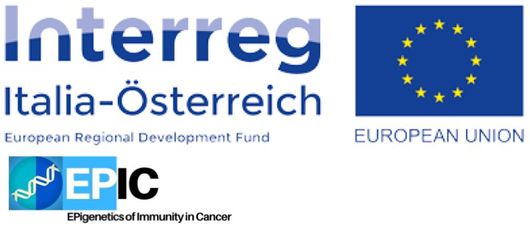Epigenetics of Immunity in Cancer (EPIC)
Project ITAT-1054

Lead Project program Interreg ITAT1054:
F. Aberger, J. Horejs-Hoeck
Project members and staff:
Florian Rathje
Hieu-Hoa Dang
Laura Urwanisch
Elisabeth Kalchschmid (Administration)
EN: Cancer incidence is high in the Interreg V-A Italia-Austria area. As a consequence, and due to costly new forms of therapy, health budgets are under increasing pressure. Supporting high quality health care while avoiding inefficiency and waste in the health care system is therefore an urgent issue to be addressed. The EPIC project will address this issue and develop better solutions for more sustainable cancer treatments. These will not only be based on the development of new drugs, but will also focus on improving drug efficacy prediction methods in cancer immunotherapy. Italian and Austrian research institutions with excellence and complementary expertise (chemistry, medicine, biology and bioinformatics) will create the EPIC network to enable new advances in cancer immunotherapy and provide open access knowledge to academia, clinical centers and all other stakeholders. The program is in line with the RIS3 (Regional Innovative Specializations) goals “smart-health” for the regions Friuli Venezia Giulia and South Tyrol, as well as the Life Science Strategy (WISS 2025) for Salzburg.
DE: Krebserkrankungen weisen in dem Gebiet von Interreg V-A Italia-Österreich eine hohe Häufigkeit auf. Als Folge dessen, und auf Grund kostspieliger neuer Therapieformen, sind die Gesundheitsbudgets unter zunehmenden Druck. Die Unterstützung einer qualitativ hochwertigen Gesundheitsversorgung unter Vermeidung von Ineffizienz und Verschwendung im Gesundheitssystem ist daher ein dringend zu behandelndes Thema. Das EPIC Projekt wird sich mit diesem Thema auseinandersetzen und bessere Lösungen für nachhaltigere Krebsbehandlungen entwickeln. Diese basieren nicht nur auf der Entwicklung neuer Medikamente, sondern werden sich auch auf die Verbesserung von Vorhersagemethoden zur Wirksamkeit von Medikamenten in der Krebsimmuntherapie konzentrieren. Italienische und österreichische Forschungseinrichtungen mit Exzellenzanspruch und komplementärer Expertise (Chemie, Medizin, Biologie und Bioinformatik) werden das EPIC Netzwerk erschaffen, um neue Fortschritte in der Immuntherapie bei Krebs zu ermöglichen und Akademien, klinischen Zentren und allen weiteren Interessengruppen offen zugängliches Wissen zur Verfügung zu stellen. Das Programm entspricht den RIS3 (Regional Innovative Specializations) Zielen „smart-health“ für die Regionen Friaul- Julisch Venezien und Südtirol, sowie der Life Science Strategie (WISS 2025) für Salzburg.
_________________________________________________________________________
IT: ll cancro è una malattia ad alta incidenza nell’area coperta dal programma di cooperazione Interreg V-A ItaliaÖsterreich. Questo determina una forte pressione sui bilanci sanitari anche in relazione ai costi delle nuove terapie. Una problematica da affrontare con urgenza riguarda la possibilità di sostenere un’assistenza sanitaria di alta qualità evitando gli sprechi e l’inefficienza. Il progetto EPIC affronterà questo problema e svilupperà soluzioni migliorative e più sostenibili per le terapie anticancro. Un approccio integrato che non si basa solo sullo sviluppo di nuovi farmaci. EPIC si concentrerà anche sul miglioramento dei metodi per prevedere l’efficacia dei farmaci nell’immunoterapia. Istituti di ricerca italiani ed austriaci, con percorsi di eccellenza e competenze complementari (Chimica, Medicina, Biologia e Bioinformatica), daranno origine alla rete EPIC per fornire nuovi progressi all’immunoterapia anticancro e per favorire la diffusione di conoscenze aperte e accessibili agli stakeholder dei territori interessati quali: le accademie, le strutture cliniche e la cittadinanza. Il programma di ricerca è pienamente integrato e conforme agli obiettivi del RIS3 (specializzazioni innovative regionali) ” smart health” per la regione Friuli-Venezia Giulia e per l’ Alto Adige/Sud Tirolo, così come, del Life Science Strategy (WISS 2025) per il Salisburghese.





